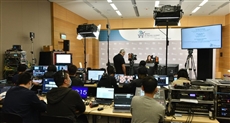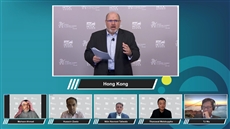Asian E-Tailing Summit closes
14 December 2020 – The fourth Asian E-tailing Summit (AES), organised by the Hong Kong Trade Development (HKTDC), ran successfully online from 9 to 11 December, featuring more than 40 business professionals from e-tailing service giants, online retail platforms and brand representatives. More than 11,000 viewers from 43 countries and regions joined the global live streaming of online webinars and presentations which examined the current business practices of small and medium-sized enterprises (SMEs) and shared global success stories and solutions, helping enterprises capture the opportunities brought by digitisation.
Summit examines e-commerce opportunities
The summit kicked off with the keynote session, “Cross-border E-commerce in the New Digital Era”, featuring heavyweight speakers from the United Arab Emirates, Thailand, Malaysia and Taiwan, including corporate representatives from FedEx Express, KPMG, Dubai South, eRomman, Priceza Co, Ltd, SAP.
Anson Bailey, Head of Technology, Media & Telecoms, Hong Kong and Head of Consumer & Retail, ASPAC at KPMG, said the trend for online purchasing, already accelerated by the pandemic, will become mainstream, with the global e-tailing market expected to grow by 16.5% in 2020. He also observed that Asia will play a major role in the change. For instance, there were more than 40 million new internet users in the region in 2020 alone. In terms of cultural influence, shopping festivals that originated in China are becoming a critical driver of sales. Among the 250,000 brands taking part in the latest Singles’ Day campaign in November, 470 generated sales of Rmb100 million or more. Mr Bailey said that enterprises should embrace the purchasing habits of tech-savvy millennials and tech-native Gen Z consumers. He also remarked that the future business model will transform from “retail” to “consumer commerce”, in which retailers will transform into marketplaces and suppliers to sell to consumers directly on platforms, cutting out the traditional middlemen.
Mohsen Ahmad, CEO – Logistics District, Dubai South, shared the blueprint for developing a global logistics hub. Taking advantage of Dubai’s geographical location and new airport development, he explained how the Dubai South project would bring a new and more efficient e-commerce ecosystem.
In addition, Hussein Zawia, CEO and Co-founder, eRomman emphasised the potential of the Middle East market, which he said has a higher e-commerce space than any other region. Mr Hussein pointed out there is increasing demand for international brands’ products in the region, with local choices being limited. He added that the pandemic has further boosted this growing demand by driving traditional consumers to shop online.
To respond to increasing global demand in the e-commerce market, Nitin Navneet Tatiwala, Managing Director, Marketing – Product, Solutions and E-commerce, AMEA, FedEx Express, said there is a need for enterprises to change their management and in particular to enhance the way they interact with customers. Using the example of FedEx, he noted that the scope of the changes made by enterprises should not stop at handling the sudden boost from the pandemic but should be more focused on long-term planning to enable them to handle future “peak of peaks” and shopping festivals.
Also sharing during this session was Thanawat Malabuppha, CEO and Co-founder, Priceza Co, Ltd, who noted that even on local e-marketplaces in Thailand, most of the sellers are cross-border companies and the vast majority are from Mainland China. These sellers open companies in other countries and offer a wide variety of products originating from the mainland. The fact that they sell at a favourable price enables them to attract many local consumers. He believed this would become a big trend in other Southeast Asian countries.
TJ Wu, Director of Centre of Excellence, SAP Customer Experience, Greater China, shared his model for a successful digital transformation – SCOOP, referring to Strategy, Culture, Organisation, Operation and Platform. He recommended that a digital transformation should be top-down, starting from the strategies and understanding the target culture rather than making the IT department the foundation of any transformation. He also said that nurturing and acquiring talents is crucial to success in any organisation.
The rise of mobile commerce
The second day of the summit featured webinars covering a range of topical issues in the e-tailing industry, including mobile commerce, personalised customer experiences and omnichannel retailing.
In a session titled “The Rise and Reach of Mobile Commerce”, global leaders from the technology sector shared their views on the prospects for this rapidly emerging industry. Emily Leung, Senior Analyst at Euromonitor International, opened a panel discussion by highlighting the significant role of mobile phones in the Asia-Pacific region (APAC), where 75% of e-commerce sales are made using mobile devices – much higher than the global average of 54%. In 2019, mobile e-commerce sales in the region amounted to US$740 billion in retail value, representing year-on-year growth of 22%, with 80% of online transactions in Mainland China made by mobile phones. She pointed out that the mainland is the current leader in mobile e-commerce and the country also has the highest year-on-year retail value growth in APAC – 23%, compared to 14% in Korea and 9% in Japan. Looking to the future, Ms Leung saw a trend for mobile e-commerce integrating with social media applications, and the potential of 5G technology for increasing mobile traffic through better networks.
When asked about the difference in strategies and applications between e-commerce and m-commerce, Stan Jit Singh, Chairman, Asia Pacific ICT Alliance Awards, said that m-commerce plays a bigger role, with more channels to reach out to mass communities, more payment methods, and greater accessibility. The younger generation in particular prefer using their mobile for shopping online and that’s why the prospects for m-commerce are more promising than for browser-based e-commerce, Mr Singh said. He also believed that m-commerce is more advantageous for enterprises as it is easier to track customers and get feedback from them. Although investment would be needed to address the threat of cybercrime, he still believed that m-commerce would reduce overall business costs for enterprises.
Lim Tian Yi, Founder and CEO, KOLI, shared a few of his successful consulting and investment examples to demonstrate how social media helps m-commerce grow. He also shared a framework for launching a successful mobile application.
Kazuhisa Iwamoto, Director, Business Creation Department, Smart-Life Division, NTT DOCOMO, INC, began sharing his views on the development of 5G by giving a brief history of mobile devices. He explained that the function of mobile phones has been evolving over the years, from satisfying communication needs to acting as a transaction-enabler. Now the era of 5G makes XR – an umbrella term for augmented, virtual, and mixed reality technologies – compatible with mobile devices. Shopping would be more comfortable, convenient and fun, providing a very different experience for consumers, he said.
Practical tips from experts
On the summit’s final day, several e-commerce elites provided advisory services to companies interested in setting up their own e-commerce platforms. Jonathan York, Consulting Manager, Euromonitor International, analysed how companies can succeed in the Association of Southeast Asian Nations (ASEAN) market through e-commerce and explored the digital consumer mindset in the region. Frankie Ng, Hong Kong Lead, Shopify, shared how the brand uses a blend of technology and strategy to win in the increasingly competitive online environment, while Harrace Lau, Co-founder of eOneNet, introduced a 10-step internet success system to help companies turn around their online business and expand globally. And Fione Tan, President, 28Mall, helped business owners wishing to enter this market resolve problems relating to cross-border logistics, customs clearance and import duties, local customer services and last-mile deliveries.
The summit is now available for viewing through video-on-demand on the AES Online website on or before 11 January 2021.
Website
Asian E-tailing Summit: http://www.hktdc.com/ncs/aes2020/en/main/index.html
|
|
|
The fourth Asian E-tailing Summit (AES) ran successfully online from 9 to 11 December, featuring more than 40 business professionals from e-tailing service giants, online retail platforms and brand representatives. More than 11,000 viewers from 43 countries and regions joined the global live streaming of online webinars and presentations which examined the current business practices of small and medium-sized enterprises (SMEs) and shared e-commerce and m-commerce success stories and solutions from across the region, helping enterprises capture the opportunities brought by digitisation |
|
|
|
The keynote session, “Cross-border E-commerce in the New Digital Era” featured heavyweight speakers from the United Arab Emirates, Thailand, Malaysia and Taiwan, including (top) Anson Bailey, Head of Technology, Media & Telecoms, Hong Kong and Head of Consumer & Retail, ASPAC at KPMG; (bottom, left to right) Mohsen Ahmad, CEO – Logistics District, Dubai South; Hussein Zawia, CEO and Co-founder, eRomman; Nitin Navneet Tatiwala, Managing Director, Marketing – Product, Solutions and E-commerce, AMEA, FedEx Express; Thanawat Malabuppha, CEO and Co-founder, Priceza Co, Ltd; and TJ Wu, Director of Centre of Excellence, SAP Customer Experience, Greater China |
|
|
|
In a session titled “The Rise and Reach of Mobile Commerce”, global leaders from the technology sector shared their views on the prospects for this rapidly emerging industry, including Emily Leung, Senior Analyst Euromonitor International (left), Stan Jit Singh, Chairman, Asia Pacific ICT Alliance Awards (right, top), Lim Tian Yi, Founder and CEO, KOLI (right, middle); and Kazuhisa Iwamoto, Director, Business Creation Department, Smart-Life Division, NTT DOCOMO, INC (right, bottom) |
Media enquiries
Please contact the HKTDC’s Communication & Public Affairs Department:
Christine Kam Tel: (852) 2584 4514 Email: christine.kam@hktdc.org
Cathy Lee Tel: (852) 2584 4393 Email: cathy.wk.lee@hktdc.org
About HKTDC
The Hong Kong Trade Development Council (HKTDC) is a statutory body established in 1966 to promote, assist and develop Hong Kong's trade. With 50 offices globally, including 13 in Mainland China, the HKTDC promotes Hong Kong as a two-way global investment and business hub. The HKTDC organises international exhibitions, conferences and business missions to create business opportunities for companies, particularly small and medium-sized enterprises (SMEs), in the mainland and international markets. The HKTDC also provides up-to-date market insights and product information via trade publications, research reports and digital news channels. For more information, please visit: www.hktdc.com/aboutus. Follow us on ![]() Twitter @hktdc and
Twitter @hktdc and ![]() LinkedIn
LinkedIn




